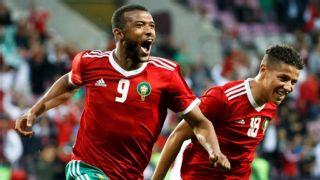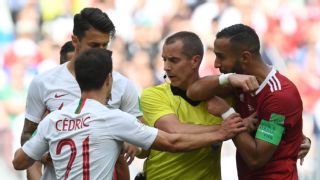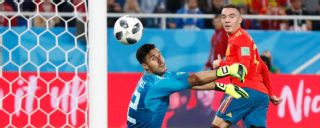|
While many of Africa's giants struggled this weekend, Morocco overcame several key absentees and squad disharmony to prove why they ought to be considered favourites for next year's Africa Cup of Nations. Of the heavyweights set to compete for the continental crown in Cameroon, Nigeria and Egypt also picked up big wins - the latter in some style - but the rest struggled through testing weekends. Senegal, Algeria, and the hosts were held away at Madagascar, The Gambia, and Comoros respectively, while Ghana suffered a first ever competitive defeat by Kenya at the Kasarani Stadium. Some of the other pretenders for the crown - Gabon, South Africa, Zambia and Uganda - all laboured to draws, while the Ivory Coast were made to work for their three points in Rwanda. Morocco, by contrast, barely broke a sweat as Malawi were dispatched in Casablanca. They were 1-0 up after three minutes when Hakim Ziyech opened the scoring after bursting down the left, and went in at the pause two goals to the good after Youssef En-Nesyri added a second after beating the offside trap. The 21-year-old forward, who scored after coming off the bench against Spain in the World Cup, netted a third 12 minutes from time following a goalkeeping error as the Atlas Lions romped to victory. Admittedly, with home advantage being so important in these qualifiers, their victory over Malawi can't directly be compared to the struggles of some of their rivals, who had to travel to faraway lands to play on synthetic pitches in front of raucous fans.  It's a win that moves them up to second place in Group B - where only one team qualify due to the presence of hosts Cameroon - and they should all but close out qualification when they face Comoros in a double-header next month. Morocco's victory came against a backdrop of some upheaval amidst potential discontent within the squad and several key absentees, although the troubles off the field weren't palpable on it. 21-year-old Amine Harit, the precocious wonderkid who represents the future of Moroccan football, was cut from the matchday squad by Herve Renard after turning up late for training. The Frenchman has taken a zero-tolerance approach to anyone who demonstrates disrespect or breaks rank, and he made no secret of the fact that the punishment meted out to Harit was to make an example of him for the rest of the squad. It was a similar story for captain Medhi Benatia, who was axed ahead of the final World Cup game against Spain and was jettisoned for this squad altogether after speaking out against Morocco's coaching staff in Russia. Perhaps Renard wouldn't have risked such a hardline approach against trickier African opponents - or if there had been something on the line against Spain - with Benatia one of the side's outstanding individuals, a true leader, and boasting almost unparalleled experience. However, in breaking the squad's united front in Russia, he was always vulnerable, and after sitting out the Malawi game, his international future remains uncertain.  As well as the 'chosen' absences of Harit and Benatia, Renard's first team was further depleted by several late injury problems. First-choice defender Manuel Da Costa and striker Khalid Boutaib missed out on the clash, although the latter may come to be seen as something of a blessing in disguise as the more rounded En-Nesyri took his opportunity with aplomb. The absentees prompted Renard into something of a reshuffle, and the former Zambia coach opted to stop the gap in the centre of the defence not with Nayef Aguerd of Dijon - a central defender - but with Monaco midfielder Youssef Ait Bennasser. His partner in the heart of defence - Romain Saiss - has also played in midfield during his career, and the duo's control in possession allowed Morocco to more easily exert their dominance over Malawi. "The defence did well," Renard told journalists. "We were without Benatia and Da Costa, but Saiss had a good match - even a superb match. "I put Ait Bennasser [in defence] so that we can play forward and get the ball forward as quickly as possible," he added. "We scored pretty goals and could have got more, but I'm happy with what we created."  Renard's adventurous against limited opposition - plugging his defence with midfielders - comes in stark contrast to the persistent conservatism of Nigeria boss Gernot Rohr when faced with similar absentees against the Seychelles. As well as innovating with a tactically logical - and progressive - approach, Renard's Morocco further demonstrated their strength in depth, their future promise and their myriad attacking options. Faycal Fajr - an old Renard favourite due to his set-piece prowess - was given the nod in midfield ahead of club-less Mbark Boussoufa, with Karim El Ahmadi retained as the one allowance for conservatism, while En-Nesyri started ahead of the dynamic trio of Ziyech, Younes Belhanda and Nordin Amrabat. Aguerd did eventually come on for his second cap, while Ajax's Noussair Mazraoui - yet another member of an increasingly 'European' squad - came off the bench for his debut. Both players, one suspects, will be key figures for the Lions for a decade to come, although competition for places will be fierce when Da Costa, Boutaib, Harit, Boussoufa - and particularly Benatia - return. In attack, Ayoub El Kaabi, Achraf Bencharki, Yacine Bammou, Walid Azaro, Mehdi Carcela, Oussama Tannane, Zakaria Labyad and even, potentially, great hope Sofiane Boufal will be competing for supporting roles - and offer the kind of creative depth that no other African team can match. With a settled side, a breadth of options, a youthful vitality and - perhaps most importantly - the AFCON nous of Renard, Morocco are proving why they are firmly the team to beat at next year's continental showpiece.
|

